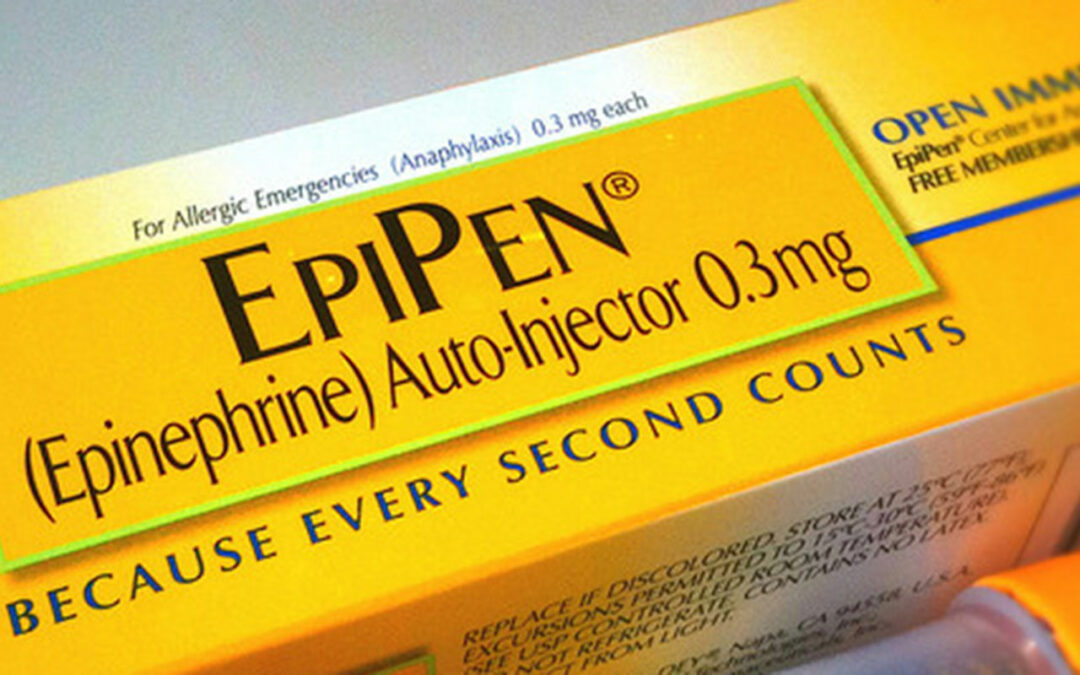Emily, my 11 year- old sister, has a severe peanut and tree nut allergy. Some children grow out of their allergy, but in Emily’s case, it is different. She has a life threatening allergy which gets worse as she grows older. In order to keep her safe, she carries around an epinephrine (Epi) pen. She uses an EpiPen in case she comes in contact with a peanut or even a food with a trace of peanut.
At the age of two, Emily found out she was allergic to peanuts. Her Grandpa gave her a handful of chopped nuts at a buffet and Emily immediately, started to develop hives on her face, especially around her mouth. She told her mother that her ears itched and her tongue hurt. Her tongue had already started to swell.
Emily was immediately taken home and administered Benadryl. She was referred to Dr. Ray S. Davis, a child allergy and asthma specialist with Allergy Consultants in St. Louis, MO. Dr. Davis prescribed an EpiPen, which contains a prescription drug. Thankfully, Emily has never had to use the EpiPen.
According to the National Institute of Allergy and Infectious Diseases, 11 million Americans suffer from food allergies, and 100 to 200 of them, mostly children, die each year from allergic reactions.
According to WebMD, a peanut allergy is a reaction that occurs when your body mistakenly identifies peanuts as harmful substances. When you eat peanuts or food containing peanuts, your immune system—the body’s natural defense system that fights infections and diseases—overreacts and can cause a serious, even life-threatening response called anaphylaxis.
WebMD states that there are many foods people are allergic to, but the main foods are: peanuts, tree nuts, dairy, eggs, fish and shellfish. People can also be allergic to stinging insects, medications and latex.
The Allergy and Asthma Network states that anaphylaxis is a sudden severe allergic reaction that may affect the whole body. Symptoms can include hives, swelling of the lips, throat or tongue, vomiting, shortness of breath, wheezing and coughing. In more severe cases, a drop in blood pressure or a loss of consciousness may occur. Symptoms can develop within seconds after exposure to the allergen.
An EpiPen is required for individuals who have food allergies and is a treatment for anaphylaxis. The EpiPen is an adrenaline hormone that increases your heart rate and blood pressure and reverses the swelling of the airways.
According to WedMD, the EpiPen is injected anywhere between the person’s hip and knee because the epinephrine is readily absorbed intramuscularly. It should never be injected into a vein, since this would cause an unsafe increase in blood pressure and possibly cause bleeding. The effects of an EpiPen only last 15 to 20 minutes. Therefore, 911 should still be called immediately. In some cases a second dose is required.
“I try the best I can to keep my child safe,” says Karen Meara, a nurse and Emily’s mom. “When I go to the grocery store, I have to read the ingredients on everything. Every time we go out to eat, I ask the chef for a peanut free menu, which lists the foods that are okay for my child to eat. It is very challenging traveling, especially out of the country, or going to places where there are no labels to read. Another challenge with a child that has a peanut allergy that most people would not think of is buying safe toiletries. Many products such as shampoo, conditioner, soaps, and lotions contain coconut or almond oils. These products have not been thoroughly tested, so I avoid them.”
“I have the option of sitting at a peanut free table [at school],” says Emily. “I get to sit with friends, but they also know to bring peanut-free lunches.”
Congress has approved a bill in 2004, called the Food Allergy Labeling and Consumer Protection Act, that is designed to help people with food allergies. This bill has required food manufacturers to make food labels easier to read and include if the product is manufactures in the same facility as other food allergens. According to Stefano Lucciolo, M.D., senior medical advisor in the Food and Drug Administration’s Office of Food Additive Safety, there is no cure for food allergies and this law helps protect citizens.

People who have peanut/tree nut allergies need to avoid the obvious foods, such as nuts and peanut butter. In addition, there are foods that contain nuts or have been manufactured in a facility that processes nut products. Here are some examples. Credit: Kaitlyn Meara.
It is not uncommon for a school’s health office to be filled with several EpiPen’s. Schools also have to deal with a new form of bullying which entails students wiping peanut butter on children with peanut allergies. Davis warns his patients about this, and instructs the parents to make sure several EpiPen’s are readily on hand at school.
Emily states,”It makes me feel good knowing I carry an EpiPen because it will help me breathe in case I accidentally eat a peanut,” states Emily. “The EpiPen gives the ambulance enough time to get there. Even if I grow out of my peanut allergy, I would still never eat a peanut because the tests may be wrong and I don’t want to take any risks. It has affected me because when I go to birthday parties, I am not allowed to eat cake or any of the other treats, especially those without a label.”
As for me, I am very protective of my younger sister and am constantly looking out for her safety. I am also proficient in the proper use of an EpiPen. Kaitlyn Meara
This Article was previously posted here: http://www.scijourner.org/2012/03/19/the-importance-of-epipens/

